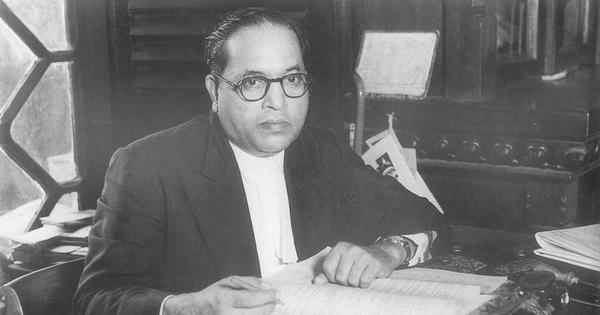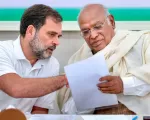Dr. B.R. Ambedkar, a towering figure in India’s struggle for social justice and equality, was not only an architect of the Indian Constitution but also a profound thinker whose ideas continue to resonate in contemporary discourse. His life and work are marked by a relentless pursuit of justice, equality, and empowerment for marginalized communities. Through his writings, speeches, and activism, Dr. Ambedkar critiqued various ideologies and movements, including the Congress and communism, offering insightful perspectives that remain relevant today.
Dr. Ambedkar’s Perspectives on the Indian National Congress
While Dr Ambedkar acknowledged the contribution of the Indian National Congress in the freedom struggle, he was critical of its approach towards social justice and the upliftment of marginalized communities. His critiques went beyond mere criticism, shedding light on various facets of the Congress party.
He observed the Congress as a party dominated by a few influential figures, notably Pandit Nehru. In his volume 1 writings, Dr. Ambedkar prophetically remarked, “The Congress is Pandit Nehru and Pandit Nehru is Congress. But is Pandit Nehru immortal?” His comment was seen pointing towards the impermanence of the Congress’s dominance, suggesting that its fate was tied to the individuals at its helm.
One of the central points of his critique was the Congress’s failure to address the deep-rooted caste system in Indian society. He identified the Congress’s electoral success as being intertwined with the exploitation of caste dynamics. He observed, “Congress always puts up candidates which belong to castes which are in the majority in the constituencies.” This observation highlights how Congress leveraged caste affiliations for political gain, thereby perpetuating and reinforcing caste divisions within society.
Dr. Ambedkar also criticized the Congress’s approach to minority communities, particularly Muslims. He noted the Congress’s failure to address the concerns of Muslims sincerely, accusing the party of diplomacy and appeasement rather than genuine engagement. His criticism extended to the Congress’s response to incidents such as the Moplah atrocities, where he saw the party’s resolution as a demonstration of carefulness to avoid offending Muslim sentiments rather than a commitment to justice.
Moreover, Dr. Ambedkar’s assessment of Mahatma Gandhi’s leadership within the Congress was scathing. He accused Gandhi of being divisive and lacking in constructive solutions, particularly during the Round Table Conference. Dr. Ambedkar highlighted Gandhi’s arrogance and dismissal of non-Congress delegates, undermining the unity necessary for effective negotiation.
In his critique of the Congress’s approach to untouchability, Dr. Ambedkar lamented the party’s insincerity and failure to translate recognition into meaningful action. He accused the Congress of neglecting the issue and criticized its token gestures as insufficient to address the deep-rooted social discrimination faced by Dalits.
In his seminal work, “Annihilation of Caste,” Dr. Ambedkar sharply criticized the Congress for its reluctance to confront caste-based discrimination. He argued that the Congress, dominated by upper-caste leaders, lacked the will to challenge the entrenched social hierarchy. Dr. Ambedkar famously declared, “The real culprit is the Hindu religion which has produced this notion of inequality.” This statement highlights his belief that the root cause of social injustice lay in the caste system, which the Congress was hesitant to let go of.
Furthermore, Dr. Ambedkar highlighted the Congress’s failure to adequately represent the interests of Dalits and other marginalized communities. He lamented, “What is the use of our Gandhianism when the Congress is on the road to becoming a reactionary body?” This criticism reflected his disillusionment with the Congress’s inability to translate its nationalist rhetoric into concrete measures for social reform.
Dr. Ambedkar’s Critique of the Communism
Dr. Ambedkar’s engagement with communism was also marked by skepticism, albeit for different reasons. While he shared some common goals with communist ideology, such as economic equality and social justice, he criticized its failure to address the specific concerns of marginalized communities, particularly Dalits.
In his essay, “The Buddha and His Dhamma,” Dr. Ambedkar argued that communism’s emphasis on class struggle overlooked the complexities of caste-based oppression in India. He stated, “Communism is like a forest fire that destroys everything in its path without distinguishing between the dry and the green.” This analogy underscores his belief that communism’s focus on class to the exclusion of caste would perpetuate the marginalization of Dalits and other oppressed groups.
One notable critique emerged in the 1940s when Dr. Ambedkar began making persistent anti-Communist statements. On the eve of the 1946 elections, he used his paper, Janata, to warn against the influence of communism, declaring, “Beware of the Communists.” This marked a significant shift in his stance towards the Communist Party of India.
Moreover, Dr. Ambedkar was wary of the authoritarian tendencies within communist regimes, which he believed stifled individual liberties and freedom of expression. He cautioned against trading one form of oppression for another, stating, “Beware of communism. Remember, socialism is not communism.” This warning reflected his belief in the importance of democratic principles and pluralism in achieving genuine social transformation.
Despite his reservations, Dr. Ambedkar acknowledged the need for collaboration between various ideological streams in the struggle for social justice. He advocated for a nuanced approach that addressed both economic inequality and social hierarchies, stating, “Political democracy cannot last unless there lies at the base of it social democracy.” This assertion highlights his vision of a society that prioritizes not only political rights but also social inclusion and equity.
His emphasis on the intersectionality of caste, class, and other forms of oppression remains relevant in contemporary debates on equality and democracy. His critique served as a call to action, urging the need for a more inclusive and equitable society beyond mere political freedom.




